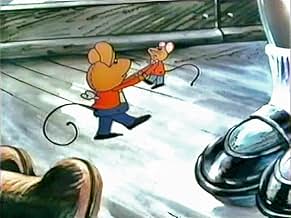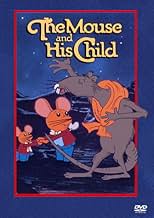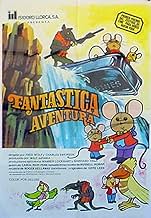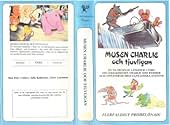Adicionar um enredo no seu idiomaAdaptation of Russell Hoban's novel about two mechanical toy mice, and their quest to become "self-winding".Adaptation of Russell Hoban's novel about two mechanical toy mice, and their quest to become "self-winding".Adaptation of Russell Hoban's novel about two mechanical toy mice, and their quest to become "self-winding".
- Direção
- Roteiristas
- Artistas
Peter Ustinov
- Manny the Rat
- (narração)
Cloris Leachman
- Euterpe
- (narração)
Sally Kellerman
- The Seal
- (narração)
Andy Devine
- The Frog
- (narração)
Alan Barzman
- The Mouse
- (narração)
Marcy Swenson
- The Mouse Child
- (narração)
John Carradine
- The Tramp
- (narração)
Neville Brand
- Iggy
- (narração)
Regis Cordic
- The Clock
- (narração)
Joan Gerber
- The Elephant
- (narração)
Maitzi Morgan
- Teller
- (narração)
- …
Frank Nelson
- Crow #1
- (narração)
Cliff Norton
- Crow #2
- (narração)
Cliff Osmond
- C. Serpentina
- (narração)
Iris Rainer
- Paper People
- (narração)
- …
Robert Ridgely
- Jack in the Box
- (narração)
- (as Bob Ridgely)
- Direção
- Roteiristas
- Elenco e equipe completos
- Produção, bilheteria e muito mais no IMDbPro
Avaliações em destaque
I aquired my own copy of "the Mouse and His Child" from a video store that (go figure) was just going to throw it away. I hadn't seen it in many years but I did remember it as being good.
Well, memory served me well, but not in the way I'd expected!
I can see why the store was so desperate to get rid of this one. Aparently, these days, you aren't going to make it in the Family section (and this really belongs in with the anime and the Bakshi) if you're quiet and introspective. This is one of the heaviest animated films ever made, but I admire it for that. Check it out, if you're able to.
What, you've never seen a cartoon where the characters contemplate infinity?
Well, memory served me well, but not in the way I'd expected!
I can see why the store was so desperate to get rid of this one. Aparently, these days, you aren't going to make it in the Family section (and this really belongs in with the anime and the Bakshi) if you're quiet and introspective. This is one of the heaviest animated films ever made, but I admire it for that. Check it out, if you're able to.
What, you've never seen a cartoon where the characters contemplate infinity?
THE MOUSE AND HIS CHILD is a symbolic study of human suffering that apparently was palmed off as a kiddie cartoon feature because of it's characters(A clockwork toy mouse and his son).This film, however, has very little that recommends it as a typical children's cartoon--it's dark, with somber colors, no chirpy songs, no silly sidekicks or lame comedy. The mouse and his child fall from the safety of their toy store window and are cast out with the garbage, after which they roam around the outside world, looking to be "self-winding". Along the way they encounter various nefarious characters, including a rat who exploits worn-out toys by forcing them to labor for him hauling scavenged items from the garbage. See the symbolism yet? I didn't when I first saw this thing when I was six, but, in regard to the reviewer who wondered if children would "get" this movie, I can say that I felt sadness for these two little toy mice, struggling to find their way in a cruel world, and wondered if they would ever be safe. I knew that the rat was the bad guy, and that the mice would have to escape him if they were to find what they wanted. There's nothing here that I believe would disturb a child, it's grim tone won't endear the movie to most families. While children might not understand the symbolic signifigance of all they see, they can understand the mice's need to belong and be happy, which is what the film is about. Try this film if you sicken from the sugar supplied by the recent Disney offerings; this one offers substantial food for thought
1977's "The Extraordinary Adventures of the Mouse and His Child" was coproduced in Hollywood by the Japanese greeting card company Sanrio, lasting a full year on a budget of $1.5 million. Russell Hoban's 1967 novel proved a difficult subject for what was advertised as a children's animated feature, confirmed by its dismal box office take as a perceived BOMB (as Leonard Maltin casually dismissed it). While the animation itself leaves much to be desired, the story remained faithful to its source and many viewers from a very young age could not forget the lessons gleaned from their long ago acquaintance. We open on a tramp with a barking dog looking through the window of McMacken's Toys to see a clockwork father mouse marching while holding his son in the air, their predetermined fate to repeat this same action every time their owner winds them up through the key in the father's back. The other toys scoff at the child mouse's wish for them all to remain a family unit, only for father and son to fall off the shelf and wind up at the dumpster, where the aforementioned tramp (the distinctive tones of venerable John Carradine) repairs the damage, winds them up, and watches them walk away to an uncertain future with but two words: "be tramps!" Top billed Peter Ustinov has a field day with Manny the Rat, putting toys like them to work as slave labor for his rodent army, not expecting these two mice to escape with the help of Andy Devine's psychic Frog (the final role for the rotund actor with the gravelly voice). The only way that the mouse and his child can be free is to become 'self winding,' thus self reliant and able to cope in a world of infinite dangers, rather than discarded when no longer needed like so many more deserving toys. The climax finds Manny earning his comeuppance and Carradine's tramp surveying things with the last two words: "be happy." The central characters are actually its weakest link, they move from one incident to the next without complaint and let others handle the rough stuff. The drab, cheerless colors are poorly realized, perhaps deliberately, ably invoking a gloomy atmosphere that still managed to sear itself into many childhood memories. Despite special billing and with only four words to speak, John Carradine fans may be forgiven to find their hero ill used, but another animated part loomed on the horizon conceived in his own arthritic image, 1982's "The Secret of NIMH," while his first such feature, "Shinbone Alley," was an adult item from 1969 that also suffered a similar disappointing fate in cinemas and still remains unappreciated. Other vocal talent on hand include Cloris Leachman, Sally Kellerman, Neville Brand, and Jack Benny sidekick Frank Nelson, all very impressive for a title that has only been issued on VHS in the US.
10runderwo
I once saw this film when I was a small child. I don't know how old, and I barely remembered anything of it, but for some reason, something was causing this full-length, animated movie to stick in the back of my mind for years as I was growing up. I realized that until I fulfilled this desire to see this film again, some part of me would be at unrest. Now, a good 15 years later and a young adult with more money and quite a different mind, I was finally able to purchase a used, rental copy.
I wasn't sure at first how I would react. Would I consider this film childish now? Made in 1977, would it show its age considerably?
I would hate to give away too much of the film, as I firmly believe it must be seen to be understood. The story is simple; a toy mouse and his 'child' embark on a quest to become 'self-winding'. In other words, a journey from childhood to adulthood, from being a robot doing what we are told without question, to becoming an individual with the capability to carry out our own passions and desires. Along their twisted and unsure way to self-fulfillment, they meet a fortune-telling frog, a windup elephant, a muskrat, and other friends, while avoiding the antagonist, the despicable Manny the Rat.
This probably sounds terrible about right here, but I can assure you that the film is likely nothing that you are thinking it is. This is not a Disney usical, nor does it try to be something that it isn't. It is a story about love, inspiration, and the following and actualization of one's dreams. It is a story about cruelty, defeat, and cowardice. Most of all, it is a story about human life, and the sacrifices we make in the journey to discover our purpose, our place in the world.
This film is never cheap, never purposely cute, and never insults the viewer. The animation is not overdone, and attention is paid to detail in all the right places. The settings are wonderful and really add to the story and the situation the main characters are in. The music sets just the right mood at the right times.
I may have enjoyed this film as a child, and I'm not sure what kept it on the back burner through the years at all, but I can definitely say as an adult now the film moved me more than it ever could have as a child. I was literally in tears after the final scene, staring at the credits in silent applause. I had finally found why I couldn't forget about this film, and that is simply because it was excellent and very touching.
Disney may have the special effects, the storybook plots, and the musical majesty. However, when examining a film at deeper than surface level, Disney in all its camaraderie can't touch this powerful and effective film that tells a story about the human condition and how simply unfair life can be.
4 Stars. Probably one of the least acclaimed (and most deserving) animated films I have ever had the pleasure of viewing.
I wasn't sure at first how I would react. Would I consider this film childish now? Made in 1977, would it show its age considerably?
I would hate to give away too much of the film, as I firmly believe it must be seen to be understood. The story is simple; a toy mouse and his 'child' embark on a quest to become 'self-winding'. In other words, a journey from childhood to adulthood, from being a robot doing what we are told without question, to becoming an individual with the capability to carry out our own passions and desires. Along their twisted and unsure way to self-fulfillment, they meet a fortune-telling frog, a windup elephant, a muskrat, and other friends, while avoiding the antagonist, the despicable Manny the Rat.
This probably sounds terrible about right here, but I can assure you that the film is likely nothing that you are thinking it is. This is not a Disney usical, nor does it try to be something that it isn't. It is a story about love, inspiration, and the following and actualization of one's dreams. It is a story about cruelty, defeat, and cowardice. Most of all, it is a story about human life, and the sacrifices we make in the journey to discover our purpose, our place in the world.
This film is never cheap, never purposely cute, and never insults the viewer. The animation is not overdone, and attention is paid to detail in all the right places. The settings are wonderful and really add to the story and the situation the main characters are in. The music sets just the right mood at the right times.
I may have enjoyed this film as a child, and I'm not sure what kept it on the back burner through the years at all, but I can definitely say as an adult now the film moved me more than it ever could have as a child. I was literally in tears after the final scene, staring at the credits in silent applause. I had finally found why I couldn't forget about this film, and that is simply because it was excellent and very touching.
Disney may have the special effects, the storybook plots, and the musical majesty. However, when examining a film at deeper than surface level, Disney in all its camaraderie can't touch this powerful and effective film that tells a story about the human condition and how simply unfair life can be.
4 Stars. Probably one of the least acclaimed (and most deserving) animated films I have ever had the pleasure of viewing.
This movie helped me along the path to liking stories with more than talking animals and large Disney Musical Productions, though there's a place for those in my viewing. This movie led me to un-childish series (mostly Japanese) with deep meanings and messages. Deep as Akira (though more comprehensible) and just as dark, this story tells about a toy "family" and a toy child's desperate wish for the family to find itself again and stay together despite cruel enemies and crueler friends. Having read the book again recently, it seems that stories Such as "Toy Story" and "A.I. Artificial Intelligence" took a little from this story's soul.
Você sabia?
- CuriosidadesSir Peter Ustinov (Manny the Rat) and Andy Devine (The Frog) also did voice work for Disney's Robin Hood (1973), in which Ustinov voiced Prince John and King Richard, and Devine voiced Friar Tuck.
- Erros de gravaçãoDuring the spring when an insane Manny shows up and uses a rock to smash the two toy mice, he isn't wearing his scarf, most likely due to the season change, and his tail was briefly missing when he cowers at the sight and aftermath of the damage he did to the toys. They both reappeared later of in his next scene when he and the other rats invade the dollhouse.
- Citações
The Mouse Child: Papa, I'm afraid! I wanna go home! What's gonna happen to us?
The Mouse: Well, something good, son, as easily as something else. Why, anything can happen.
Manny the Rat: But it won't! Not this evening, my lads!
- Cenas durante ou pós-créditosIn the Japanese release, the closing credits are altered and feature pictures of characters from the film, which are shown alongside the text on multi-colored backgrounds.
- Versões alternativasThe American release has closing credits simply displayed against a pink background. However, the Japanese release has alternative closing credits with images of characters (see Crazy Credits).
- ConexõesReferenced in Hudson Hawk, o Falcão Está à Solta (1991)
Principais escolhas
Faça login para avaliar e ver a lista de recomendações personalizadas
- How long is The Mouse and His Child?Fornecido pela Alexa
Detalhes
- Data de lançamento
- Países de origem
- Central de atendimento oficial
- Idioma
- Também conhecido como
- The Extraordinary Adventures of the Mouse and His Child
- Empresas de produção
- Consulte mais créditos da empresa na IMDbPro
Contribua para esta página
Sugerir uma alteração ou adicionar conteúdo ausente

Principal brecha
By what name was The Mouse and His Child (1977) officially released in Canada in English?
Responda




























